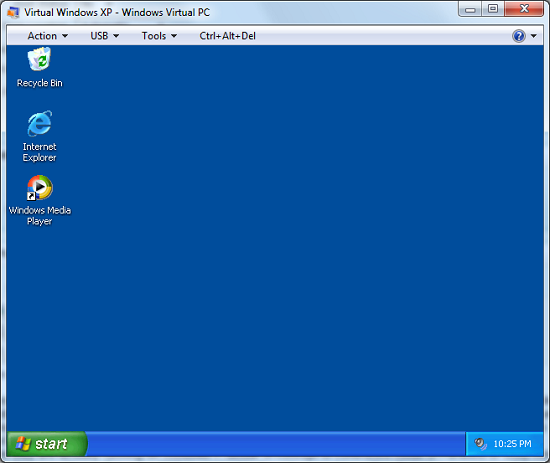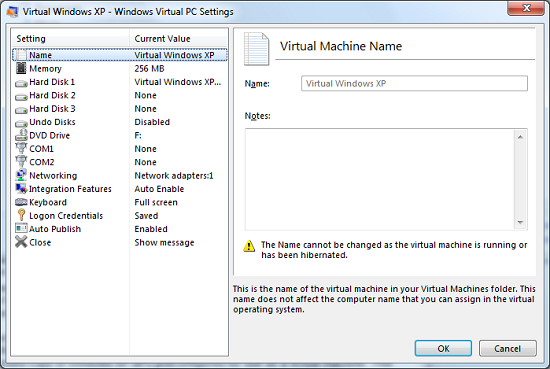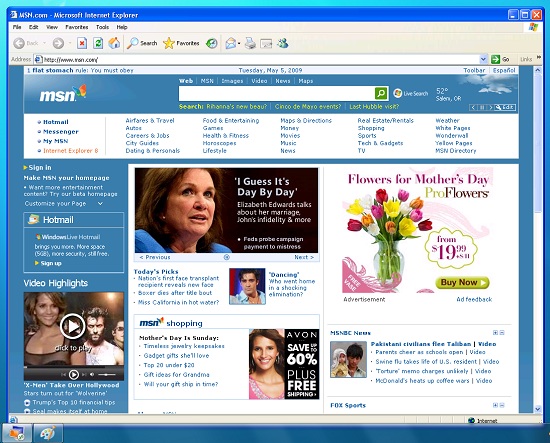Windows 7: Release Candidate 1 Preview
by Ryan Smith and Gary Key on May 5, 2009 11:00 PM EST- Posted in
- Systems
Virtual Windows XP
As we mentioned previously, Microsoft’s big secret unveiled with Windows 7 RC1 is Virtual Windows XP (VXP for short). One of the issues Microsoft has been having in bringing business users over from Win2K and XP to Vista and beyond has been that Windows does not have perfect backwards compatibility. With consumer applications this is not such a big deal since most of those are wide-audience products that get updated regularly, but this is not always the case for business software. Whether it’s some custom in-house application that no one can fix, or a 3rd party application that just works and can’t be updated, business users sometimes can’t escape the fact that they need to be able to run old applications that don’t work in newer operating systems.
VXP is in essence the bone Microsoft is throwing to business users to allow them to run those old applications while using Windows 7. VXP leverages Microsoft’s existing Virtual PC virtualization software that they acquired several years back, by bundling it with a fully licensed copy of Windows XP SP3 preconfigured for use as a virtual machine. This virtual machine can then be partially integrated in Windows 7 so that applications operating inside of it look and behave like they are actually running on Windows XP, similar in concept to the coherence mode of Parallels or Unity mode of VMware. In this case Microsoft is using RDP to connect to the virtual machine rather than screen scraping the entire desktop like Parallels and VMware do. Microsoft does the same thing for the Windows Home Server Console.

VXP Desktop View
As Virtual PC was already free, the significance of this announcement is not the technical details, but rather that Microsoft is endorsing it as an official solution to backwards compatibility problems. It’s long been expected that Microsoft would do something with Virtual PC as a backwards compatibility solution and this is finally it, albeit in a limited role.
Because of the system requirements and issues raised by relying on a virtual machine of XP, VXP is a last-ditch compatibility solution rather than any kind of primary solution. On the system requirement side, VXP requires a processor with hardware virtualization features, along with at least 256MB of RAM and the disk space needed to run the virtual machine. It’s not too bad for a modern system, but it does rule out an older system that may be suitable for upgrading to Windows 7, but not running VXP on top of that.

VXP Configuration
As for the issues raised by using VXP, first and foremost it’s a complete copy of WinXP, with all of its security deficiencies and bugs. It needs security software, it needs administration, and it needs security updates. This also brings up a matter that Microsoft hasn’t answered yet: what happens when WinXP support ends in 2014? Windows 7 will have support until at least 2020, which means either Microsoft is going to drop support for this component of Windows 7 early (an unprecedented move) or they have to extend XP support to match Windows 7’s support cycle. We’re still trying to get a final answer on this.
It should also be noted that VXP only comes with Professional edition and higher, as it’s not intended to be a consumer compatibility solution. And before anyone gets any ideas, it’s not suitable for playing games – the graphics hardware is the usual emulated S3 Trio 64, and the screen does not refresh nearly fast enough to keep up with any kind of action game. Solitaire may be playable, however.

VXP in integrated mode running IE6
At any rate, Virtual Windows XP is a good solution to some compatibility needs, so long as it’s recognized that it’s not the solution to all compatibility needs. For the handful of business users it’s designed for, we would expect that it does its intended job well. However for non-business users that absolutely must have a virtual machine (and won’t need support from Microsoft), it may be worthwhile to look into a free solution like VirtualBox.
Looking towards the future, there has been a lot of speculation that Microsoft may try to make a big break from the Windows APIs in order to clear out all the cruft and deprecated functions that litter their APIs. This isn’t happening today with Windows 7 and VXP, but integrating a virtual machine is the first stepping stone in making it happen. What Microsoft does after VXP is undoubtedly going to be a matter of great interest.










121 Comments
View All Comments
Gary Key - Thursday, May 7, 2009 - link
Actually, the public release of the 8.612 betas work fine with the HD 4770. AMD made a couple of changes right before they were posted on the site. :)CSMR - Wednesday, May 6, 2009 - link
Best source of information on Windows 7 by far. Nice work!ssj4Gogeta - Wednesday, May 6, 2009 - link
In the article you said that the "Jump Menus" have their roots in OS X? Not at all. They've been their for years. The only example I can think of at this time is Winamp. It had a "jump menu" in Windows 98 for controlling playback.Axell - Wednesday, May 6, 2009 - link
Well, this is actually Windows 7 Release Candidate. There won't be a second RC, so it's "Release Candidate" only, no RC1 like the title and text suggests.vectorm12 - Wednesday, May 6, 2009 - link
Just for the sake of argument.Ever thought about how long it usually takes for MS to actually make their OS:es work well? Doesn't anyone remember what a abysmal OS XP was before SP1 let alone SP2(which in my opinion was the point where I felt confident enough to upgrade from win2k). I'm starting to wonder if people have actually forgotten how much they where complaining about XP before SP1&2 or if they just don't want to remember. What about the security vulnerabilities that still plague XP? The fact that both Vista and Win7 improves on these seem to have been lost in the quest to keep XP alive.
After all do you hear Apple users complaining about 10.5.6 being significantly slower in many respects than 10.4? The fact that 10.4 in my opinion had a bunch of features lost in 10.5 that where really useful doesn't seem to bother them half as much. In the end I think this whole discussion has become more of a "hey I'm cool for bashing Microsoft and Vista rather than keeping an open mind and actually seeing the improvements they make"
How long did it take for Microsoft to make windows 2k a better OS than NT4.0 besides the USB support (which for the first couple of years was more or less pointless anyway).
Windows 95 and RC2 and so on. I mean it usually takes years for MS to actually make a OS superior to the older version.
What sets Windows7 apart from Vista in my opinion is just that.
Windows 7 may as well be a dressed up/optimized/"insert random comment" version of Windows Vista. Sure they could have made major GUI changes and feature updates to Vista through service packs etc but the fact is that when people hear or think vista it usually equals "dog turd" or worse and usually that is because it's become cool to bash Vista. In my opinion I wouldn't hesitate to run Vista SP1 on our studio computer where I work but unfortunately most of the software required for production purposes require specific software configurations which means Vista isn't supported other than in the latest releases.
The name change is a chance for people to try what in many ways is a vastly improved OS without having that association in mind when doing so. Sure Windows 7 is still more bloated and in certain areas probably slower than XP because of bloated code/new functions etc but the fact is Microsoft has actually taken a lot of great functionality in vista and(most likely taken inspiration from Mac OS in certain areas) and improved upon it even further.
I for one want a Microsoft OS for my gaming computer. I can't be bothered running Linux and wine just to play WoW and run the Adobe suite. Given the choice I'm going for Win7 rather than XP or vista, it's safer, I've got performance to spare and there's nothing wrong with a little eyecandy to make things look more exciting.
Macs are fine but to be honest I don't like OS x THAT much to pay the premium.
Linux works perfectly on my work computer and on the servers I run at work or on my laptop that I use to surf the web.
leexgx - Wednesday, May 6, 2009 - link
apart from some drivers XP has allways worked well for me (+ i was behind an router so RDP basid worms was not an problem),Vista is slugish and bloted for the most part and it allways will be as thay not port stuff to vista that are makeing windows 7 run far more smoother,
i have loaded win 7 onto an amd64 3000+ 2ghz, 2gb ram, it works well there is One small bug not sure why but it thinks i got 16gb installed in an socket 754 socket lol, but lists 2gb useable (at least Win7 now Shows Both numbers useable and installed as on SP1 for vista that was an joke hideing useable ram) need to report that to MS but not sure where i submit that
Lexington02 - Wednesday, May 6, 2009 - link
:face palm:You have 32 bit and that is not MS's fault for 32bit portion, it is pure math. Also 64 bit will always be slower than 32 bit on the same specs. Think about it, 64 is twice as big as 32 bit...
Bmadd - Wednesday, May 6, 2009 - link
If any of that was refering to my post my Thanks MS was for giving me the features i wanted and not having to go to win7. Not that they make bad products. I love the one ppl "hate" the most. PS xp needs to be laid to rest, pleaseiAURA - Wednesday, May 6, 2009 - link
I'm in the same boat as the above poster, all I will get from W7 is a "funner" GUI and DX11, but hey, there's still tons of game being released as DX9 games.ssj4Gogeta - Wednesday, May 6, 2009 - link
DX11 will be released for Vista as well.